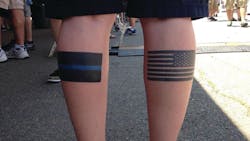Recently, my staff and I were discussing the department’s tattoo policy which was very draconian at best. Now if you don’t know me, I have ink, lots of it; however all of mine are covered when in uniform. So, I am on both sides of the debate. The area of the country in which we work is still somewhat cloistered from modern trends so visible ink would be a community interest issue. However, I was concerned that should we get a stellar applicant especially a military veteran, who could have visible ink, where do we draw or redraw the line? After some research of other departments, we rewrote our policy to get with the times – a little. Like most policies, we specified now that there will be no visible ink on face, neck, hands and arms, with some allowable and per the chief’s discretion on the legs (bike uniforms). It’s not perfect but a start.
Today in America, depending on whose numbers you believe, it is safe to state that approximately 20% of us are inked. The lower the age bracket 26-40 the numbers nearly double that number. According to a national Harris Poll done in 2012, nearly 25 percent of all Americans have at least one tattoo, and for those between the ages of 30 to 39, that figure was 40 percent. Conversely, there is a growing trend with many police departments to take a strong stances against visible tattoos on their uniformed officers. Now you know my dilemma with this conversation, local opinion and trust verses the rest of the nation. The same Harris poll stated that 75 percent of respondents said that a visible tattoo had little or no effect on how they felt about someone. Still have to take considerations on what the locals will tolerate.
Prospective applicants and ink
For those readers considering a career as a law enforcement officer or any emergency responder for that matter, stop before considering a tattoo or other body modification (piercings) before you do it. First of all, do some research and determine if the departments you desire to apply with have any current tattoo regulations. They may not now, but a nationwide trend is emerging and in some localities the pendulum is swinging back and forth. My department subscribes to IACP.net service. This is a subscription service for police executives to share information and research. I performed a policy search for tattoos and there are several model policies now nationwide. The phrase that keeps resurfacing is ‘no visible tattoos while in uniform’. Some policies also include special assignments such as bike officers or where shorts are allowed in more temperate climates. So, I fell into the nationwide standard with ours.
As with policies, there could be some wiggle room or may be not. Many inked applicants may say that they elect to wear long sleeves and tie year round, wrong! Most agencies have uniform policies and dictate when you will wear short or long sleeves. If the agency allows cover-ups, then there are some companies that sell arm sleeves that you match to your skin tone. Go to TatJacket (www.tatjacket.com) for their product line. These could offer a solution to some department’s regulations and great to meet your prospective in-laws.
Military Changes!
Leave it to the military to get into this as well. In April 2014, the US Army released the revised Army Regulation 670-1. This addressed banning extremist, indecent, sexist and racist tattoos. Soldiers now are prohibited from having tattoos on their head, face, neck, wrists, hands and fingers. Soldiers may have no more than four visible tattoos below the elbow or below the knee, and these tattoos must be smaller than the size of the wearer’s hand. Sleeve tattoos are not allowed below the elbow or the knee. Basically, if you are in your physical training attire (t-shirts and shorts) the ink best not be visible to the first sergeant. Soldiers who are not in compliance with the new tattoo policy but were compliant with previous policies are grandfathered, according to the new regulation. This new policy may address future applicants seeking cop jobs post military. But this still leaves a group caught as well.
Life Decisions
Whether or not you go into traditional law enforcement, you should think fully about obtaining body art. Get the job, find out the game rules and the departmental culture. The current chief may not care but a change in administration and you are now looked at with disdain. Another glaring consideration is to be sure that you are on the ‘PC path’. You could easily get a design that may not mean anything to most but could be considered or misconstrued as politically incorrect. Perform your research and get a second opinion. The more I speak to prospective applicants at colleges and see way too much visible ink, I have to give them a fair warning. To apply to some departments will be a No-Go. They either have to have them removed or seek other venues with liberal policies.
If you observe an incumbent/veteran officer(s) with visible tattoos, this is not your open invitation to go to the parlor! Some departments as the military may grandfather in inked incumbents with their current ink and no further. Again, this will be local policy and interpreted by the powers that be. This could be a conditional rule of employment as well. Now for you and the veterans that were grandfathered in, I only want you to fully understand the changing times. No, I am not anti-tattoo, I am an illustrated man recall? We need to seek a reasonable balance here. If you have ink, research what the department you are applying to allows; you might have to apply to another department. If you are considering a tattoo, research this fully, a discrete one may be the solution. My intent is for you to enjoy your future in law enforcement and not create unnecessary battles.

William L. Harvey | Chief
William L. "Bill" Harvey is a U.S. Army Military Police Corps veteran. He has a BA in criminology from St. Leo University and is a graduate of the Southern Police Institute of the University of Louisville (103rd AOC). Harvey served for over 23 years with the Savannah (GA) Police Department in field operations, investigations and completed his career as the director of training. Served as the chief of police of the Lebanon City Police Dept (PA) for over seven years and then ten years as Chief of Police for the Ephrata Police Dept (PA). In retirement he continues to publish for professional periodicals and train.



